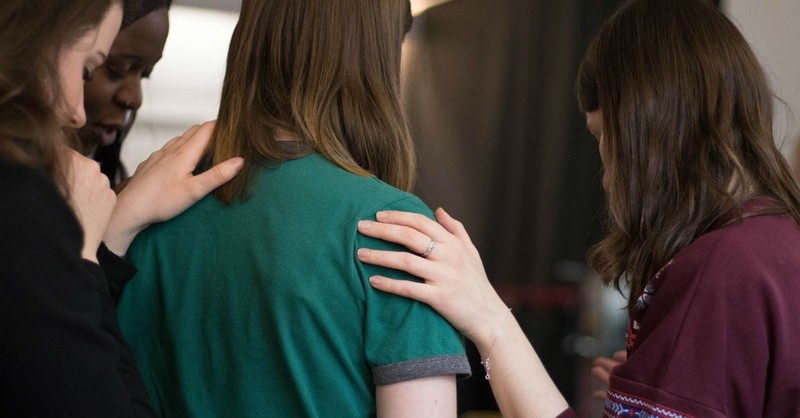
“Trying hard to make it through today.” A friend wrote this cryptic Facebook post in the hopes of getting people to respond.
And it worked.
Within an hour friends who saw the post responded with questions like: “What happened?” and “It’s going to be ok.” It scratched my friend’s itch for attention for a bit, then I saw another cryptic post a week later.
The proliferation of social media has blurred the lines between what is public and private. It’s more difficult now than ever to know the difference between what should be talked about to everyone and what should be just between friends. In a world where YouTube reigns supreme and live streaming apps emerge, your life is under a microscope, and your actions can be broadcast for all to observe.
Here are three reasons why vulnerability on social media doesn’t work:
Photo Credit: Unsplash/Brooke Cagle

1. It only builds walls, not demolishes them.
Social media is controlled in that you post only what you want people to see, allowing for a certain level of transparency. Even when you post too much information on social media, it would be inappropriate to post everything you are feeling and thinking. Even when it appears as though walls in your life are being torn down, they are not torn down completely.
2. It invites us to post only the best versions of ourselves.
When we scroll through other people’s profiles, it’s easy to think they are doing better than we are. This comparison trap contributes to a higher rate of depression. And comparing ourselves to others is a hindrance to intimacy with God. Therefore, it is a hindrance to vulnerability because we may see ourselves as weak or not as “put together” as others. Social media perpetuates the need to put on a mask around others, showing others only what we want them to see.
Photo Credit: Pexels

3. It doesn’t allow you to express yourself fully.
How can you be truly vulnerable in only 280 characters on Twitter? It allows you to post a snippet of life, but to truly be vulnerable, you must be able to express yourself fully and share all your story, not just some of it. A small group setting allows you to do just that. Not even Sunday morning fellowship can promise that. But in a small group setting, all members get a chance to share their testimony with the other members of the group.
Photo Credit: Thinkstock

"True connection and community can only be achieved through face-to-face interactions."
In the midst of all of this technology, it’s not easy to trade the convenience and instant gratification of social media pats on the back for the deep intimacy and connection that the church and relationship with God can provide.
This is where the church shines. Although people think they are meeting their need for connection and community on social media, true connection and community can only be achieved through face-to-face interactions with brothers and sisters in Christ.
Here are three ways vulnerability is achieved through the church body:
Photo Credit: Unsplash

1. Trust forms in a safe church environment.
When people meet together on a regular basis, those walls that are constructed on social media begin to show cracks. Soon, people who want to be seen as perfect begin to discuss their issues with work, family, and ultimately themselves. When this is shared without judgment, trust forms. People begin to share the good, bad, and ugly of their lives.
2. The church holds up people arms.
"When Moses’ hands grew tired, they took a stone and put it under him and he sat on it. Aaron and Hur held his hands up—one on one side, one on the other—so that his hands remained steady till sunset," Exodus 17:12.
When people are a part of a community, they no longer feel alone. They know they have people who will help them when they are weary and burdened by life’s troubles. Everyone is real with each other, exposing their weaknesses and championing each other in their triumphs.
Photo Credit: Unsplash

3. The church changes your perspective.
In 2 Kings 6:17, the prophet Elisha thought he was outnumbered and he was defeated in battle. But an encounter with God changed his perspective:
"And Elisha prayed, 'Open his eyes, LORD, so that he may see.' Then the LORD opened the servant’s eyes, and he looked and saw the hills full of horses and chariots of fire all around Elisha."
It may seem as if you can’t possibly win at life and that the enemy has you surrounded. But Elisha asks God to help him see the truth of his situation, and the Lord delivered. What would it be like to know you have brothers and sisters in Christ that always have your back? This is an assurance not promised on social media.
Photo Credit: Pexels

"The more people engage in the pseudo community of social media, the more isolated they feel."
The more people engage in the pseudo community of social media, the more isolated they feel. Their longing for authentic, personal connection increases. Small groups provide the gateway to meet that need for connection and community. A small group setting provides the intimate atmosphere in which people can express prayer requests and develop deep, long-lasting relationships with other believers. This is the prime environment for discipleship to take place.
As Christians, we need to use social media as a conduit for initial connection with both Christians and Non-Christians. Because social media may connect people to you, but that interaction might ultimately connect them to Christ.
Here are some ways to help you achieve real vulnerability:
Photo Credit: Pexels

1. Share your whole story.
Include not just the pleasant things but also the hard aspects of your story. This allows people to get to know you better. While social media invites you to post only the good things, the church body invites you to share all of you, without feeling condemned.
2. Refrain from comparing yourself to others.
Comparison is natural on social media. But loving yourself for who you are and living in the truth that you are sons and daughters of the King is an essential element in being truly vulnerable. This realization grounds your confidence in God. When you live in this truth everyday, there is no room for comparison.
Photo Credit: Unsplash

3. Listen more than you speak.
If church members allow you to share your story with them, return the favor by listening to them too. In a small group, people who dominate conversations can kill the momentum of a group. People quit because they don’t feel heard or acknowledged. If you are attending a small group because you have a need to be accepted, chances are others are there for the same reason. You can’t take all the attention for yourself; you must return the same favor to the other members of the group.
Photo Credit: Unpsplash

4. Be a friend.
The reason why Moses had Aaron and Hur to hold up his arms is because they knew him well enough to know when he was weary. Attending church every week does not guarantee good friendships; being known by people for who you are does. Be the friend that can spot when someone is feeling down or not themselves. Practice the golden rule on others and more than likely, you will have others who will want to do the same for you.
Photo Credit: Pexels

"We were created with a need to know and be known by others."
Social media creates a pseudo community that achieves intimacy only for a short time. We were created with a need to know and be known by others. When you open yourself up to others within the church body, you will often be accepted for who you are. This is the ultimate goal of vulnerability and simply can’t be achieved through social media. Posting on platforms like Facebook and Twitter makes you known for a short time, but becoming connected in a small group makes you known for eternity.
Michelle S. Lazurek is an award-winning author, speaker, pastor's wife and mother. Winner of the Golden Scroll Children's Book of the Year, the Enduring Light Silver Medal and the Maxwell Award, she is a member of the Christian Author's Network and the Advanced Writers and Speakers Association. She is also an associate literary agent with Wordwise Media Services. For more information, please visit her website at michellelazurek.com.
Photo Credit: Unsplash
Originally published Thursday, 31 May 2018.



